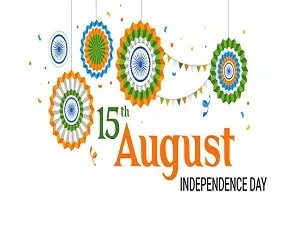Independence Day 2023
Updated On - 14 Aug 2023
Independence Day in India is celebrated every year on 15 August. The day marks India's freedom from the British rule. It is a national holiday for government and private offices as well as banks, schools and colleges, and almost all other organizations in the country.
How Is Independence Day Celebrated in India?

15 August every year is a very auspicious day for the Indians who will get an opportunity to pay homage to all freedom fighters. Since it is a national holiday, all regional-level, state-level and national-level government offices will remain shut after the flag-hoisting ceremony. Commercial outlets may also remain closed. Or, operating hours may be lessened. Schools and colleges across the country will organise various types of competitions for students and award winners.
Special contests and programs are organised by online, print and broadcast channels. Cinemas related to Indian freedom fighters may be shown on television. On the eve of Independence Day, the Indian President will address the country. In Delhi, the Indian Prime Minister will attend the flag-hoisting ceremony and also address the nation at the Red Fort. Cultural programs and events are held at both the state and national levels. Artists will capture this opportunity to exhibit their hidden talent and get recognised and awarded. In some places, the families of freedom fighters are honored on Independence Day.
The Indian Independence Act 1947
The Indian Independence Act 1947 was ruled on 15 August 1947 by the United Kingdom (UK) parliament. The judicial sovereignty was transmitted to the Indian Constituent Assembly. King George VI, the father of Queen Elizabeth II, continued to head the state until the transmission of the country to a complete Republican Constitutions had been finished. India struggled hard to attain the freedom from British administration under the flagship of Mahatma Gandhi, who is today recognised as the 'Father of the Nation.'
India was under the control of British rule for more than 2 hundred years. The country desperately wanted to attain the freedom from foreign rulers. In 1857, against the law of British East India Company, the very first crusade occurred. Later on, the campaign for India's freedom was summoned by several names, including Indian Mutiny, Revolt of 1857, Great Rebellion and India's First War of Independence. The role of Mohandas Karamchand Gandhi was crucial in attaining independence from British. He was followed by many freedom fighters across the nation. Jawaharlal Nehru became the first Prime Minister of India post-independence
Symbols Of Independence Day
Independence Day is symbolised by the kite flying event. People buy the kites of various colors, shades and styles from the market. A very important symbol of Independence Day is the Red Fort in Delhi. It is the place where the first Indian Prime Minister unveiled the Indian flag on 15 August 1947.
Multiple Ways To Celebrate Independence Day
- Plan a tour: Plan a short trip to the nearest destination.
- Attend the flag hoisting ceremony: The people staying around the city of Delhi can consider taking a short trip to Delhi on Independence Day to witness the flag-hoisting ceremony, which is beautiful to watch.
- Watch patriotic cinemas: This is the best thing you can do. There are many movies based on India's struggle for attaining freedom.
FAQs on Independence Day 2023
- Which year of independence would it be in 2023?
India will celebrate its 76th Independence Day on 15th August 2023.
- What is the theme of the 76th Independence Day?
The 76th Independence Day in India will be celebrated under the theme 'Nation First, Always First' as part of the events organised for 'Azadi ka Amrit Mahotsav.' The government has planned a series of programs to celebrate the diverse cultures of the country.
- Why is 15 August observed as India's Independence Day?
India celebrates 15 August as its Independence Day because on this day in 1947, the British colonial forces left Indian soil, granting Indians the power to establish an independent nation. Additionally, British India was partitioned into India and Pakistan on the midnight of 14-15 August 1947, marking a significant milestone in India's freedom struggle.
- How is Independence Day celebrated in India?
Independence Day is celebrated across India with flag-raising ceremonies, parades, and the singing of the national anthem. The Prime Minister leads the flag-raising ceremony at the historic Red Fort in Old Delhi, followed by a parade involving the police and armed forces. Cultural programs are also held in state capitals, and schools, residential complexes, and offices organize flag-hoisting functions. Government offices in the national capital are closed but illuminated in celebration.
- Where does the Prime Minister hoist the Indian flag on Independence Day?
The Indian Prime Minister hoists the Indian tricolour flag at the Red Fort in Old Delhi on Independence Day.
- Did the partition of India and Pakistan occur on Independence Day?
Yes, the partition of India and Pakistan took place on Independence Day. The Indian Independence Act, passed by the British Parliament, mandated the demarcation of the dominions of India and Pakistan by midnight on 14-15 August 1947.
- How did India achieve independence from British rule?
India's struggle for independence from British rule was led by Mahatma Gandhi, who organized and led nonviolent protests. Other prominent figures in the independence movement include Mohammed Ali Jinnah, the founder of Pakistan and the leader of the All India Muslim League, and Jawaharlal Nehru, India's first Prime Minister and a follower of Gandhi.
- What is the difference between Independence Day and Republic Day?
Independence Day and Republic Day in India are observed on different dates. Republic Day is celebrated on 26 January, while Independence Day is celebrated on 15 August. Republic Day commemorates the day when the Constitution of India came into effect, symbolizing India as a sovereign democratic republic. Independence Day, on the other hand, honours the sacrifices of freedom fighters and marks India's liberation from British colonial rule.
